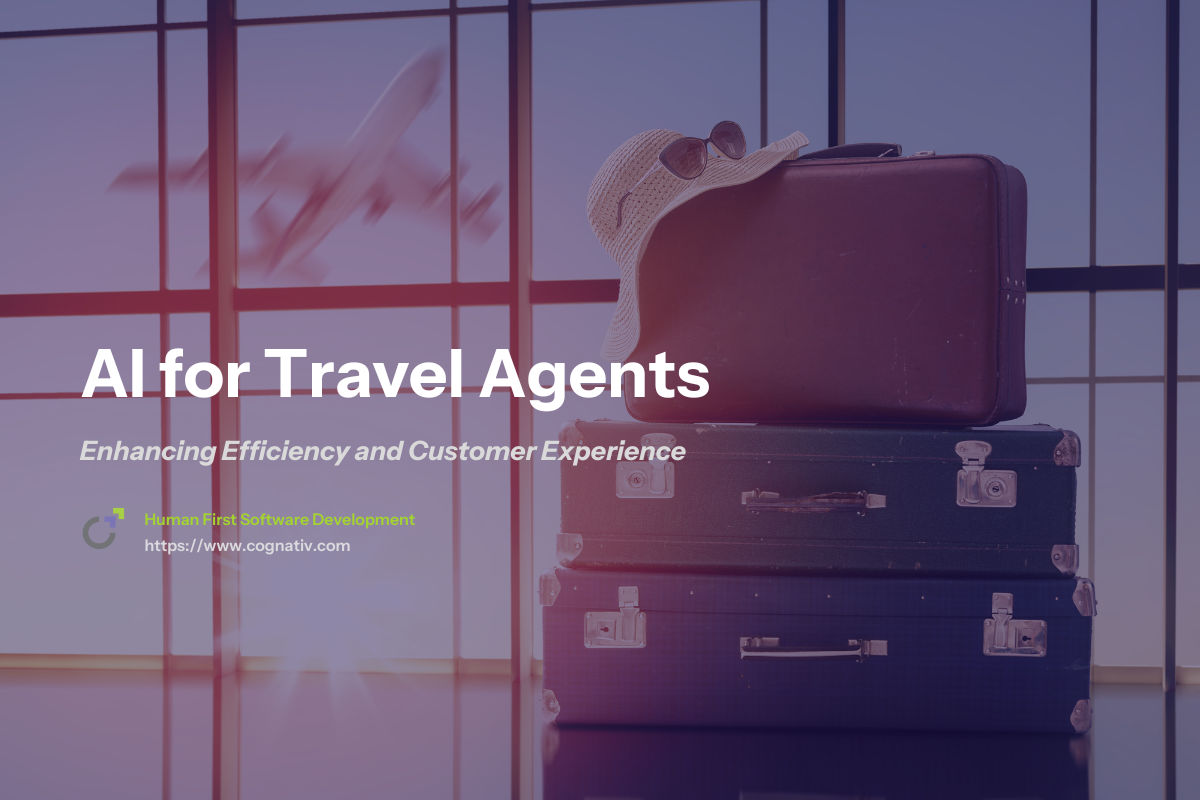AI for Travel Agents: Enhancing Efficiency and Customer Experience
The travel industry is entering a new phase of digital transformation. What once relied on manual booking processes, offline planning, and human agents is now being redefined by artificial intelligence. AI travel agents are reshaping how tour operators, travel agencies, and travel companies engage with their customers.
Using machine learning algorithms, natural language processing, and predictive analytics, modern AI travel assistants are capable of offering personalized recommendations, handling complex customer queries, and optimizing dynamic pricing models in real time.
This isn’t just a technological upgrade. It’s a strategic shift toward operational efficiency, data-driven travel planning, and personalized service at scale.

The Rise of AI Travel Agents
An AI travel agent functions as an intelligent digital assistant capable of automating key parts of the travel journey. Unlike traditional travel agents that rely on manual research and direct supplier negotiations, AI travel assistants can analyze user behavior data, historical travel patterns, and real-time market trends to create tailored recommendations in seconds.
Key advantages include:
-
Continuous availability and 24/7 customer support
-
Real-time integration with CRM systems for personalized service
-
Scalability to handle thousands of simultaneous interactions
-
Faster, data-informed responses for itinerary planning, hotel prices, and flight recommendations
This technology is already being adopted by travel agencies, tour operators, and online travel platforms aiming to stay ahead of competitors and deliver more customized experiences.

How AI Travel Agents Work?
AI travel agents rely on a combination of advanced AI technologies to deliver fast and relevant answers:
-
Natural Language Processing (NLP): Understanding and responding to customer queries in multiple languages. This allows AI travel assistants to deliver intuitive, conversational experiences.
-
Predictive Analytics: Forecasting market demand and pricing trends based on historical data and live inventory. This is essential for optimizing dynamic pricing strategies.
-
CRM Integration: Accessing customer preferences, travel history, and loyalty profiles to offer individualized options that align with personal travel styles and budgets.
-
Machine Learning: Continuously learning from user interactions, post trip feedback, and booking outcomes to fine-tune future recommendations.
These capabilities enable travel agents to operate with precision, speed, and scale—improving both customer satisfaction and operational outcomes.

Enhancing Efficiency and Customer Experience
For travel agencies, efficiency is a competitive advantage. AI travel agents create measurable impact in three primary areas:
-
Operational Efficiency:
-
Automation of repetitive tasks like itinerary generation, hotel price comparison, and flight searches.
-
Reduction of manual workload for human agents, allowing them to focus on high-value interactions.
-
Integration with CRM systems to minimize data entry and streamline workflows.
-
-
Customer Experience:
-
AI agents can personalize every stage of the booking process—from trip inspiration to final confirmations.
-
Multilingual support expands service accessibility for a global customer base.
-
Real-time answers improve responsiveness and trust.
-
-
Strategic Insights:
-
Travel agencies can analyze customer behavior and identify pain points in the journey.
-
This enables more precise targeting, improved upselling strategies, and long-term relationship building.
-
The combination of automation and personalization creates a service layer that scales without losing the human touch.

Tailored Recommendations and Next Trip Planning
The ability to deliver tailored recommendations is one of the most powerful advantages of AI travel agents. By analyzing user behavior data and individual preferences, AI can:
-
Suggest hidden gems and unique destinations off the beaten path
-
Adapt travel itineraries dynamically as users adjust their choices
-
Provide recommendations aligned with travel styles — from business travel to family vacation planning
-
Automate the next trip re-engagement cycle through predictive re-targeting
AI-powered travel assistants can also connect recommendations with real-time inventory and pricing, ensuring that customers see offers that are actually bookable, not just inspirational.

AI Solutions for Travel Development
For travel businesses looking to modernize their infrastructure, AI solutions offer several core capabilities:
-
Dynamic Pricing Engines: AI can fine-tune pricing strategies based on travel demand, historical trends, and competitor data.
-
Personalized Itineraries: Automated generation of customized plans based on customer profiles.
-
Customer Feedback Analysis: Sentiment analysis and behavioral data mining to continuously improve service quality.
-
Predictive Forecasting: Demand prediction allows better allocation of resources and more accurate yield management.
These AI-driven solutions are not only improving booking processes but also helping travel agencies future-proof their business models.

Developing and Scaling AI Travel Assistant Apps
Building a scalable AI travel assistant app requires a modular architecture—a flexible structure that allows integration with multiple platforms, suppliers, and CRM systems.
Key features for a scalable MVP include:
-
Personalized recommendations based on user preferences
-
Automated multilingual customer support
-
Seamless CRM integration
-
Dynamic pricing capabilities
-
Real-time flight and hotel updates
To scale effectively, travel technology providers should:
-
Integrate feedback loops to improve models with post trip feedback
-
Fine tune AI models for better personalization over time
-
Use modular integration to support multiple languages, geographies, and travel partners
This modular strategy allows travel businesses to adapt rapidly to shifting customer behavior and market trends without rebuilding entire systems.

Technical Foundation: The AI Travel Tech Stack
Modern AI travel agents are built on a stack of machine learning and data analytics technologies designed for speed, scale, and adaptability. Typical components include:
-
AI Models & Machine Learning Algorithms: Powering itinerary generation, personalized recommendations, and pricing strategies.
-
Natural Language Processing: Understanding and responding to customer queries accurately in real time.
-
CRM System Integration: Ensuring a unified view of customers across touchpoints.
-
Multilingual Support: Expanding reach to global travelers.
-
Predictive Analytics Engines: Anticipating travel demand and optimizing inventory allocation.
Together, these tools form a highly adaptive AI architecture capable of driving both operational gains and customer experience improvements.

Challenges and Considerations
While AI travel assistants deliver undeniable benefits, their deployment requires careful consideration. Common challenges include:
-
Ensuring accuracy and relevance in personalized recommendations
-
Handling sensitive customer data securely within CRM ecosystems
-
Achieving seamless multilingual support at scale
-
Balancing automation with the need for human oversight in complex or high-value transactions
-
Managing ongoing model training to reflect evolving travel patterns and market trends
Strategic implementation—including strong data governance, modular design, and continuous feedback loops—is essential to overcome these obstacles.

Looking Ahead: AI and the Future of Travel
AI travel agents are reshaping how trips are imagined, planned, and booked. As AI technologies mature, their role will only deepen:
-
Generative AI will enhance itinerary creation with conversational, context-rich suggestions.
-
Predictive analytics will give travel agencies unprecedented foresight into demand fluctuations.
-
AI-driven travel planners will act as trusted digital travel companions, integrating booking, support, and post trip feedback loops.
-
Modular platforms will allow rapid adaptation to new markets and travel trends.
For travel businesses, the strategic imperative is clear: embrace AI-driven solutions today to create sustainable competitive advantage tomorrow. Those who do will set the standard for how the travel industry operates in the age of intelligent automation.


